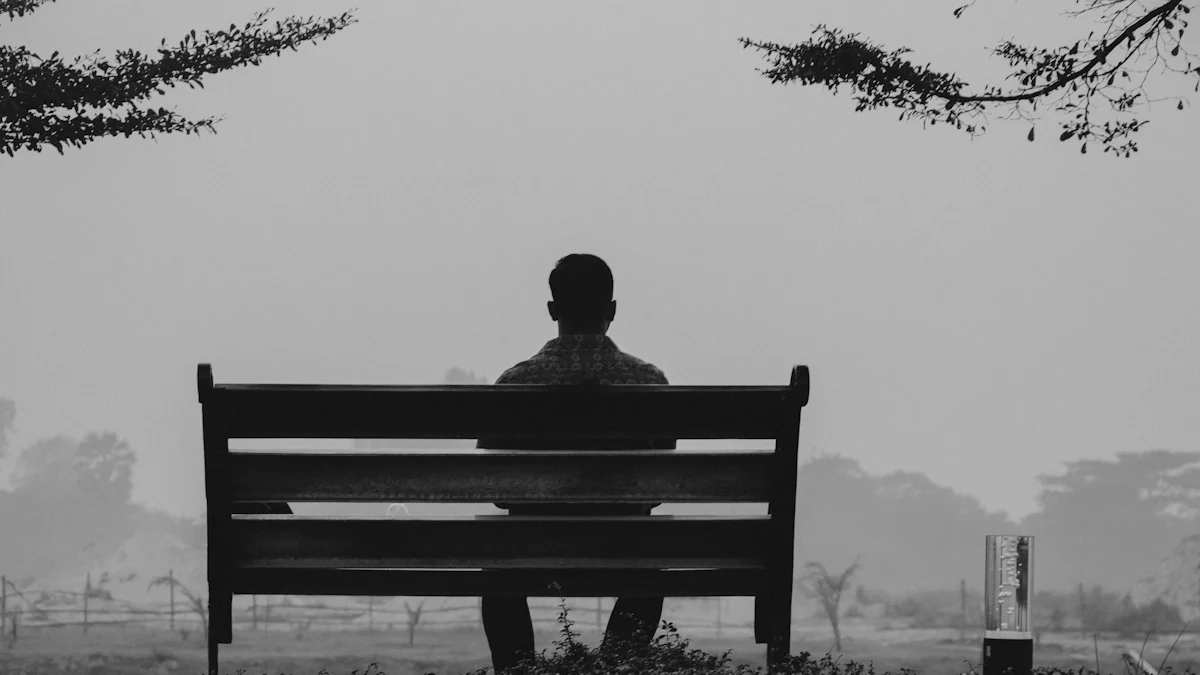Why Male Loneliness is on the Rise in Modern Society

You might not realize it, but the male loneliness epidemic is quietly reshaping modern society. Millions of men across the globe experience emotional isolation, often without a clear path to connection. Cultural expectations discourage vulnerability, making it harder for men to express their feelings or seek support. This isolation doesn’t just affect emotions—it impacts physical health too, increasing risks for heart disease and high blood pressure. Whether you’re navigating the digital age or facing life transitions, loneliness can feel overwhelming. But understanding this issue is the first step toward change.
Key Takeaways
Male loneliness is becoming a big problem. In 2021, only 27% of men said they had six close friends, compared to 55% in 1990. This shows the need for more connection.
Society often tells men not to show emotions. This makes it harder for them to ask for help. Sharing feelings can make friendships stronger and reduce loneliness.
Feeling lonely can harm both the mind and body. It can lead to depression, anxiety, and long-term health problems. Making friends can help people feel better overall.
Community programs give men chances to make friends and find support. Joining these activities helps them feel like they belong.
Talking to a therapist can help men deal with loneliness. It also teaches them how to connect with others. Talking about mental health is important to stop the stigma.
The Male Loneliness Epidemic

Alarming Statistics
Rising rates of loneliness among men
The male loneliness epidemic has grown significantly over the past few decades, with studies revealing troubling trends. In 1990, 55% of men reported having at least six close friends. By 2021, that number had dropped to just 27%. Even more concerning, 15% of men now say they have no close friends at all—a fivefold increase since 1990. This decline in meaningful connections highlights a deepening sense of isolation among men.
Age also plays a role. Loneliness peaks during mid-life and old age, leaving many men feeling disconnected during critical stages of their lives. A 2023 study found that younger generations, particularly Generation Z, often feel unknown by others. This sense of invisibility can lead to emotional struggles, with 40% of men meeting the criteria for depressive symptoms. These statistics paint a clear picture: loneliness is not just a fleeting feeling but a widespread issue affecting millions.
Comparison of male and female loneliness trends
When comparing male and female loneliness, distinct patterns emerge. Men are less likely to admit feeling lonely, which makes their struggles harder to address. Women, on the other hand, tend to have more close friendships and are more open about their emotions. For example, 15% of men report having no close friends, compared to 10% of women. Research also shows that loneliness peaks for men in mid-life and old age, while women experience more varied trends. These differences suggest that societal expectations and gender norms play a significant role in shaping how loneliness manifests.
Aspect | Male Loneliness Trends | Female Loneliness Trends |
|---|---|---|
Admission of Loneliness | Less likely to admit feeling lonely | More likely to admit feeling lonely |
Close Friendships | Fewer close friends than women | More close friends than men |
Loneliness Peaks | Mid-life and later in old age | Varies, but generally lower peaks |
Why It Matters
Societal consequences of male loneliness
The male loneliness epidemic doesn’t just affect individuals—it impacts society as a whole. Men who feel isolated often struggle with mental health issues like depression and anxiety, which can lead to decreased productivity and strained relationships. Loneliness also increases the risk of chronic illnesses, placing a greater burden on healthcare systems. Communities suffer when men withdraw, as their absence weakens social bonds and reduces participation in community activities. Addressing male loneliness is not just about improving individual lives; it’s about creating stronger, more connected societies.
The stigma surrounding loneliness in men
One of the biggest barriers to solving the male loneliness epidemic is stigma. Many men feel pressure to appear strong and self-reliant, which discourages them from admitting feelings of loneliness. This reluctance often prevents them from seeking help or building meaningful connections. Societal norms that equate vulnerability with weakness further compound the issue. Starting conversations about loneliness and normalizing emotional openness can help break down these barriers. When men feel safe to express their emotions, they are more likely to seek support and form lasting relationships.
Key Factors Driving Male Loneliness
Societal Expectations
The pressure to conform to traditional masculinity
Society often expects men to embody traditional masculinity, which can create a heavy burden. You might feel pressured to appear strong, independent, and emotionally invulnerable. These expectations can distance you from fulfilling basic human needs for connection. Men are frequently taught to suppress emotions and avoid vulnerability, which discourages seeking support or forming deep relationships. This cultural norm fosters emotional self-reliance, leaving you feeling isolated and disconnected from others. Over time, this cycle of emotional suppression can make it harder to build meaningful connections, exacerbating loneliness.
Emotional suppression and vulnerability stigma
Suppressing emotions may seem like a way to maintain strength, but it often leads to fewer meaningful relationships. Traditional masculinity promotes self-reliance, which can prevent you from admitting when you need help. This mindset creates emotionally distant friendships and hinders the formation of close bonds. Without open discussions about feelings, loneliness can grow unchecked. Breaking free from this stigma requires embracing vulnerability and recognizing that emotional openness is a sign of strength, not weakness.
Technology and Social Media
The illusion of connection in the digital age
Social media might seem like a solution to loneliness, but it often creates an illusion of connection. Online platforms provide opportunities to interact, yet these interactions can lack depth. You may find yourself scrolling through feeds or engaging in shallow conversations that fail to satisfy your need for genuine connection. Comparing your life to the idealized versions presented online can also intensify feelings of inadequacy. This cycle can leave you feeling more isolated, even as you engage with others digitally.
Decline in face-to-face interactions
Face-to-face interactions have declined significantly in recent years, contributing to the male loneliness epidemic. A study during lockdowns revealed that increased social media use heightened feelings of loneliness, showing that digital interactions cannot replace in-person connections. Only 27% of men now report having six close friends, a sharp drop from 30 years ago. Prioritizing career success over personal relationships further limits opportunities for meaningful interactions. Rebuilding these connections requires making time for in-person conversations and prioritizing relationships over digital distractions.
Erosion of Social Structures
Decline in community-based activities
Community-based activities once provided men with spaces to connect and build friendships. The decline of organized religion and fraternal organizations has left many without these vital support systems. You might find fewer opportunities to engage in group activities that foster camaraderie and belonging. This erosion of social structures has weakened the bonds that once helped men combat loneliness.
The impact of work culture and individualism
Modern work culture and the emphasis on individualism have also contributed to male loneliness. The pressure to succeed professionally often comes at the expense of personal relationships. Emotional suppression, equated with strength, can lead to isolation and unhealthy coping mechanisms. The decrease in male connection spaces, such as fraternal organizations, further limits opportunities to form deep friendships. To counteract this, you can seek out new ways to connect, such as joining community groups or prioritizing work-life balance.
The Impact of Loneliness on Men's Health

Mental Health Effects
Increased rates of depression and anxiety
Loneliness can take a heavy toll on your mental health. When you feel isolated, it’s easy to spiral into feelings of worthlessness or hopelessness. This emotional state often leads to depression. Studies show that people who frequently feel lonely are more than twice as likely to experience depression compared to those who don’t. Anxiety is another common outcome. Chronic loneliness can feed an anxious mindset, making you worry excessively about being alone or misunderstood. For men, societal expectations to appear strong can intensify these struggles, leaving you feeling trapped in silence.
Evidence | Description |
|---|---|
Loneliness and Depression | People who often feel lonely are more than twice as likely to experience depression. |
Loneliness and Anxiety | Chronic loneliness can predict anxiety, feeding an anxious mindset. |
The link between loneliness and suicide
The male loneliness epidemic has a devastating connection to suicide. Persistent loneliness can push you to seek an escape from emotional pain, sometimes leading to suicidal thoughts. Between 2020 and 2021, suicide rates for men aged 15 to 24 increased by 8%. Men are nearly four times more likely than women to die by suicide, accounting for 80% of all suicides. In a recent survey, 44% of men reported experiencing suicidal ideation within the past two weeks. These alarming statistics highlight the urgent need to address loneliness before it escalates into a crisis.
Physical Health Consequences
Loneliness and chronic illnesses
Loneliness doesn’t just affect your mind—it impacts your body too. Feeling isolated can increase your risk of chronic illnesses like cardiovascular disease and dementia. Research shows that loneliness raises the likelihood of developing cardiovascular disease or stroke by 30% and dementia by 40%. It also contributes to premature death, with lonely individuals facing a 50% higher risk of dying early. These statistics reveal how deeply loneliness can harm your overall health.
Health Consequence | Increased Risk (%) |
|---|---|
Cardiovascular disease | 30 |
Stroke or coronary artery disease | 30 |
Dementia | 40 |
Premature death | >50 |
Stress and its physiological effects
Stress caused by loneliness can wreak havoc on your body. Prolonged loneliness activates your stress response, leading to inflammation and raising your risk of high blood pressure. This increases your chances of developing cardiovascular disease by nearly one-third. Loneliness also weakens your immune system, making you more vulnerable to illnesses. Poor sleep quality is another consequence, leaving you feeling fatigued and less able to cope with daily challenges. Addressing loneliness can help you reduce stress and improve your physical well-being.
Tip: Taking small steps to connect with others can significantly improve both your mental and physical health. Whether it’s joining a community group or reaching out to a friend, every effort counts.
Solutions to Address Male Loneliness
Redefining Masculinity
Encouraging emotional openness
Redefining masculinity starts with embracing emotional openness. You can challenge outdated norms by taking small but meaningful steps:
Share caregiving responsibilities at home to build stronger connections.
Speak openly about your struggles to normalize seeking help.
Confront stereotypes when you encounter them to inspire change.
These actions create a ripple effect, encouraging others to follow your lead. Emotional openness doesn’t weaken you—it strengthens your relationships and fosters a sense of belonging.
Challenging harmful stereotypes
Harmful stereotypes often discourage men from expressing vulnerability. Public health campaigns have shown that challenging these stereotypes can reduce loneliness, especially among middle-aged men. When you reject negative rhetoric about masculinity, you help create a culture where emotional expression is valued. This shift can break the cycle of isolation and help combat the male loneliness epidemic.
Building Social Connections
The importance of friendships and support networks
Friendships and support networks are vital for your well-being. As one man shared, “I found myself feeling increasingly lonely and disconnected from others. It wasn’t until I made a conscious effort to reach out to my old friends and schedule regular meet-ups that I started feeling a significant improvement in my overall well-being.” Knowing you have a support system boosts your confidence and emotional resilience, even if you don’t see your friends often.
Community programs and initiatives for men
Community programs offer excellent opportunities to build connections. Here are some initiatives making a difference:
Program Name | Description |
|---|---|
Movember | Focuses on social connections for men. |
The Banksia Project | Aims to support men's mental health. |
Man Cave TV | Provides a platform for men to share experiences. |
Gamers vs. Depression | Combats loneliness through gaming communities. |
Digital Dads Groups | Connects fathers digitally to share experiences. |
These programs foster camaraderie and emotional intelligence, helping men find like-minded individuals and build lasting relationships.
Seeking Professional Support
Normalizing therapy and mental health resources
Therapy offers a safe space to explore feelings of isolation. It helps you develop social skills, improve self-esteem, and uncover the root causes of loneliness. By seeking therapy, you challenge the stigma surrounding mental health and set an example for others. Techniques like cognitive behavioral therapy (CBT) can help you reframe negative thoughts, while solution-focused therapy guides you in building meaningful connections.
Tools and strategies for addressing loneliness
Professional support equips you with practical tools to combat loneliness:
Practice initiating conversations with open-ended questions.
Join activities or classes that align with your interests.
Prioritize social interactions as part of your routine.
Use technology to maintain connections with friends and family.
These strategies empower you to take control of your social life and foster deeper, more meaningful relationships.
Male loneliness is a pressing issue that requires action from both society and individuals. You can help redefine masculinity by promoting emotional expression and challenging outdated stereotypes. Community programs and therapy can provide safe spaces for men to connect and grow. Policymakers, like those in Pau, France, have shown that targeted initiatives can make a difference by addressing isolation directly.
On a personal level, you can take small but impactful steps. Reconnect with old friends or join group activities to meet like-minded people. Focus on building meaningful relationships rather than chasing a large social circle. Prioritize self-care and use technology to maintain connections. Every effort you make contributes to a more connected and supportive world. Together, we can combat male loneliness and create a society where no one feels left behind.
FAQ
What are some small steps I can take to combat loneliness?
Start by reaching out to someone you trust. Join a local group or class that interests you. Schedule regular meet-ups with friends or family. Even small actions, like smiling at a stranger or starting a conversation, can help you feel more connected.
Tip: Consistency matters. Make connecting with others a habit.
How can I open up emotionally without feeling weak?
Begin by sharing small feelings with someone you trust. Practice expressing gratitude or discussing positive experiences. Emotional openness shows strength, not weakness. It builds deeper relationships and helps you feel understood.
Note: Vulnerability is a bridge to stronger connections, not a sign of failure.
Can technology help me build meaningful relationships?
Yes, but use it wisely. Video calls and messaging apps can maintain long-distance connections. However, prioritize quality over quantity. Avoid relying solely on social media, as it often lacks depth.
Reminder: Balance online interactions with face-to-face connections for a healthier social life.
What should I do if I feel overwhelmed by loneliness?
Take one step at a time. Speak with a trusted friend or family member. Consider joining a support group or seeking professional help. You don’t have to face loneliness alone.
Encouragement: Asking for help is a courageous first step toward healing.
Are there specific activities that help men connect with others?
Yes! Try joining a sports team, volunteering, or participating in hobby-based groups. Activities like hiking, gaming, or attending workshops create opportunities to meet like-minded people.
Tip: Shared interests make it easier to form genuine connections.
